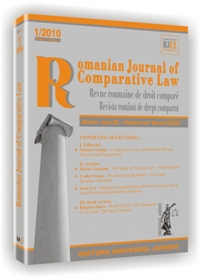Le changement de religion en égypte
The change of religion in Egypt
Author(s): Sami A. Aldeeb Abu-SahliehSubject(s): Law, Constitution, Jurisprudence
Published by: Universul Juridic
Keywords: Egyptian law; religious freedom; apostasy; death penalty; marriage; inheritance; custody of children; Christian minorities; Bahaʹi
Summary/Abstract: In Egypt, according to the constitution, Islam is the religion of the state, and the principles of Islamic law are the main source of legislation (article 1). This constitution states that ʺThe State shall guarantee the freedom of belief and the freedom of practice of religious ritesʺ (art. 46) and that ʺAll citizens are equal before the law. They have equal public rights and duties without discrimination between them due to race, ethnic origin, language, religion or creedʺ (article 40). Both articles, however, must be understood within the limits set by Islamic law, which encourages everyone to convert to Islam, prescribes death penalty against whoever leaves Islam, and recognizes only the followers of the three monotheistic religions. Even if death penalty (demanded by Muslim authorities) is not provided under Egyptian law, abandonment of Islam has consequences that are equivalent to civil death: the apostate can not marry and if he was already, he is separated from his wife, his children are kidnapped, his estate is open, he cannot inherit, and only his Muslim heirs can inherit him. He cannot obtain an identity card, which denies him the basic rights to live. That is why the converts to Islam are practically obliged to leave the country to live their faith. Recognition of only the monotheistic religions hits the Bahaʹi community which has about 3,000 followers, who are living dead, victims of discrimination on all levels.
Journal: Revista Română de Drept Comparat
- Issue Year: 2010
- Issue No: 01
- Page Range: 147-196
- Page Count: 50
- Language: Romanian
- Content File-PDF

